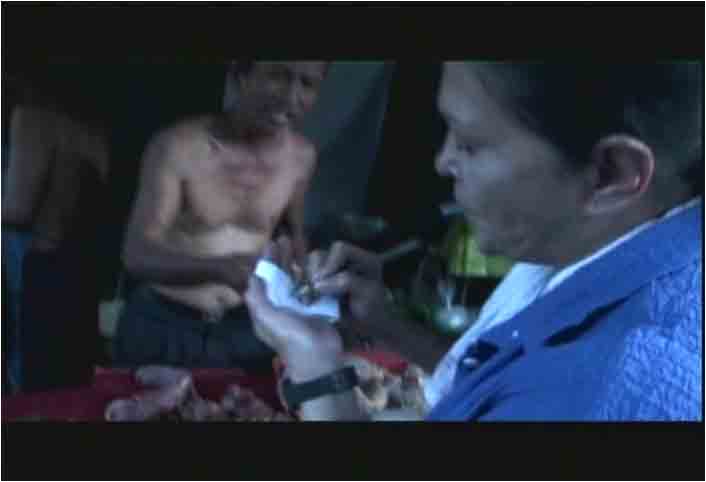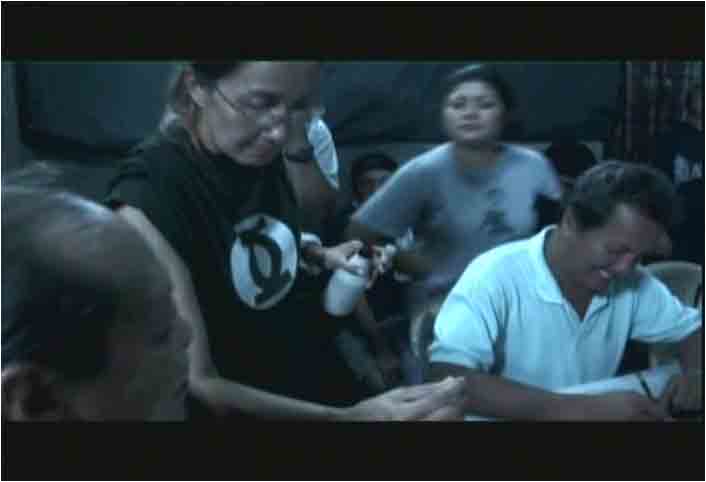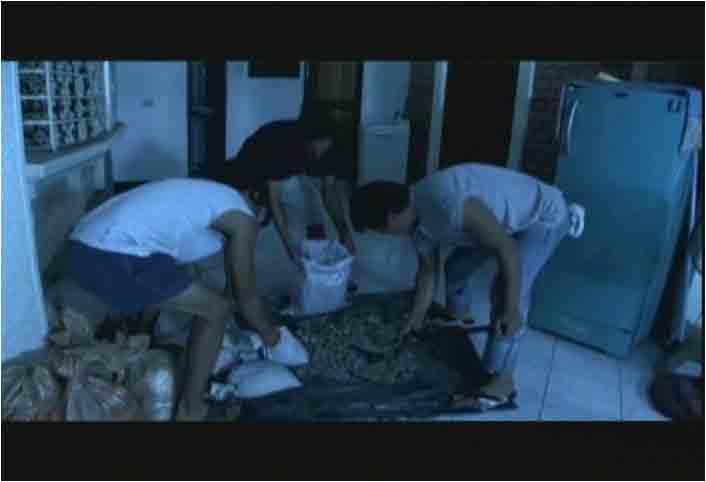Second of two parts (Click here to read Part 1)
click to see larger view With the morning draw done, Aling Amelita shuffles home for a siesta. “
Magpapahinga siya, matutulog. Papakain ng mga anak. Tapos labas ulit ng mga 2:30 pm. May mga ‘text advisory’ na naman, kokolektahin. Cut-off ng 3:30 pm, draw ulit 4:30 pm (She takes a nap. Feeds the kids. Then goes out again around 2:30 pm. She gets ‘text advisories’ again, and collects the bets. Cut-off is at 3:30 pm, and another draw is held at 4:30 pm)," relates Ralston Jover, Aling Amelita’s former neighbor who wrote the story of the film Kubrador based on her real life as a jueteng bet collector. Between late afternoon and about 8:30 pm, Aling Amelita collects bets for the third and last draw of the day, held around 9:30 pm. “
Hinabaan nila yata yung hapon kasi diyan nag-uuwian ang mga galing sa trabaho. Rush hour, di ba? Strategic lahat yan (They extended the hours in the afternoon because that’s the time people come home from work. Rush hour, right? It’s all strategic)."
Jueteng sales talk
Cobradores have broad networks in their communities, and solicit bets by connecting dreams and events in their neighbors’ lives to jueteng numerology.
How a
cobrador cajoles people to place bets is a study in creative salesmanship. A conversation between Aling Amelita and a reluctant bettor could begin with her asking point blank, “
O, ikaw, ano ang taya mo? (Hey you, what’s your bet?)" To which the person might reply, “
Ah, Aling Amelita, kasi ano e, may sakit ang anak ko, hindi muna ako tataya (Ah, Aling Amelita, um, my kid is sick so I’m not going to place a bet for now)." Aling Amelita would then press for more details to find a link to jueteng numerology. “
Anong sakit? Baka ito ang ibig sabihin nun (What is the illness? Maybe this is what it means)." With jueteng, life’s daily miseries are never bereft of meaning. On other occasions, Aling Amelita would feign nonchalance, then casually bring up a story while having coffee: “
Alam mo ba, ang tumama kagabi P27,000. Ang taya ganito lang (Did you know, the winner last night won P27,000. The bet was only this much)." Her companions then start digging into their pockets. “
Sandali, may barya pa yata ako diyan (Just a minute, I think I still have some spare change)."
Bail on credit
A cobrador who gets arrested can avail of the table manager’s “bail on credit" program.
Like jueteng itself, a
cobrador’s life is a game of chance. Everyday, Aling Amelita does not know whether or not she will be arrested, or how many bets she will be able to collect. “
’Pag biglang naghigpit ang pulis dahil may advise ang head, magmomoro-moro ulit, aarestuhin sila (If the police suddenly crack down because there’s a directive from the head, there will be a charade again and there will be arrests)," explains Jover. But the table manager is prepared for such eventualities, with a “bail on credit" program.
Cobradores who have been caught are lent money to post bail, which they pay back in installments out of future collections. Jover also learned that males in particular can opt for the “palit-ulo" (“switch heads") arrangement. “
’Pag pasok ng isa sa kulungan, may kapalit na lalabas, para tuloy-tuloy ang pagkukubra. Hindi nire-record [ng pulis] (As one enters the detention cell, another one is released to take his place. So the bet-collecting is not disrupted. There is no police record)."
Christmas basket and hospital assistance The benefits do not stop there. At Christmastime,
cabos and
cobradores receive baskets of groceries and cash gifts in envelopes. If a family member gets sick, they can run to the table manager for assistance. Depending on the extent of help needed, the table manager can escalate the problem to the politically-connected
capitalista. Jover cites an example. “
Kunwari may kailangang ipa-ospital. May kilala na silang ospital. Kasi mga LGUs sila, di ba? Isang tawag lang yan (For instance, if someone needs to be sent to the hospital, they already know a hospital. Because they are local government officials, right? All it takes is one phone call)." Such string-pulling may be a boon to needy
cobradores, but the ties that bind jueteng lords and local officials seriously weaken the credibility of government, retired police general Wilfredo Reotutar asserted in a report on illegal gambling presented during the term of former President Joseph Estrada. “Crime syndicates controlling these illegal gambling activities can become so big and so powerful . . . In various parts of the Philippines, [jueteng] lords interfere with the assignment and reassignment of [police] officers who do not toe the line."
OFW remittance service Not all perks require the intervention of government contacts, however. Jueteng may be more than a century old, but jueteng lords innovate with the times. With microcredit services for bail, and emergency loans for misplaced bets and assorted catastrophes, jueteng has spawned a veritable shadow banking system that also offers an OFW (overseas Filipino worker) remittance service for cobradores. “
Malaki daw ang bawas sa remittance (They find money transfer charges expensive)," relays Jover, “
so sasabihin nila, ‘Magpapadala ang anak ko. Pwede bang bumale? Babayaran ko na lang ‘pag pasok ng remittance, diretso sa pondo’ (so they say, ‘My kid will be sending money. Can I have an advance? I’ll pay it back when the remittance comes in, straight to the fund’)." The table manager advances the cash, with the jueteng “system of trust" the only collateral securing the transaction. On pay day, the cobrador’s relative who works abroad deposits payment straight to the jueteng operation’s bank account. No surprise then that
cobradores feel a deep sense of loyalty toward the table manager. In exchange for all the assistance given, the only expectation is that they work hard everyday through dust, heat, rain, smog, and threat of arrest, and not pilfer a cent from the collections. If everyone in the group does their part, the jueteng motto is achieved: “Everybody happy".
“Corporate social responsibility" The community as a whole also relies on the jueteng operation for social services where the government and other institutions have fallen short. The
capitalista knows that breeding a codependent relationship through “aid" and “corporate social responsibility" is useful for business—and politics.
Capitalistas are known to occasionally shoulder the cost of constructing recreational facilities, such as basketball courts, and chip in when a cobrador goes around, cup in hand, asking for burial assistance for a member of the community.

The welfare of the community is so intertwined with the health of the jueteng operation that during elections, the jueteng workforce doubles as political machinery to ensure the victory of candidates who will continue protecting the illegal trade.
The economic welfare of the community becomes so dependent on the health of the jueteng operation, that during elections, the jueteng workforce doubles as political machinery to ensure the victory of candidates who will continue protecting the illegal trade. The
capitalista decides who the favored candidate is, and everyone falls in line to back him up.
“Ginagamit silang mga poll watchers (They are used as poll watchers)," says Jover. “Especially the younger generation. Pwede rin sila ang taga-distribute ng leaflets (They also distribute leaflets)."
If “everybody happy", how bad can this be? The problem lies in the erosion of the authority of the state, retired police general Reotutar averred in his report on illegal gambling. “The big amount set aside for protection has caused the spread of graft and corruption in the political and police sectors of government. This problem has reached an alarming level that must be resolved to show credibility, sincerity, and transparency on the part of government . . . Trust and public confidence of the people in their government must always be maintained."
Livelihood programJueteng vs lotto The 6/42 lotto of the Philippine Charity Sweepstakes Office (PCSO) was launched in 1995 (and later joined by the 6/45 Mega Lotto, the 6/49 Super Lotto, and the 6/55 Grand Lotto). While successful at raising funds for charity, the lotto failed to eradicate jueteng. There are a few reasons why. First, the odds of winning in jueteng are markedly better compared to the lotto (assuming there is no rigging). The probability of guessing the winning combination in jueteng, at 1 out of 1,369, is much higher than the 1 in 5,245,786 chance of guessing the winning combination in the 6/42 lotto. (Note: Numbers can be repeated in jueteng, but not in lotto.) Second, the minimum bet for jueteng can be as low as P1, while the minimum bet for the lotto is ten times more “expensive" at P10. Third, jueteng operators typically hold three draws a day, while the 6/42 lotto holds only three draws a week. The frequency of jueteng draws means jueteng bettors have more chances of winning in a day, and know the results of their bets within hours. Fourth, the number of bettors vying to win in one jueteng draw is much smaller compared to the lotto. Jueteng bets are aggregated at the community level, while lotto draws are aggregated at the national level. While the larger pool of bettors enables the lotto to dangle a bigger carrot (the record-breaking P741 million pot of the 6/55 lotto was won by a single winner on November 29, 2010), the probability of winning is low. Jueteng offers smaller but (theoretically) quicker returns, paying P700 to P900 for every winning P1 bet. Finally, the reach of lotto stations is limited compared to the formidable door-to-door network of cobradores. While lotto booths are manned by harried staff who bark at customers suffering in long queues, the sociable cobrador personally visits clients at home or at work, soliciting bets, dishing out gossip, delivering prizes, analyzing dreams, and spreading tempting news about how the neighbor’s cousin’s son won P10,000 from yesterday’s draw. Once in office, the favored candidate is expected to keep his word or risk upsetting the army of jueteng cogs who got him elected. Jover recounts an incident that occurred in one town in Northern Luzon. “
Dati, nung pinaghigpitan ang jueteng, lumabas lahat ng cabo at cobrador sa isang bayan. Pinuno nila ang buong plaza in protest (Once when there was a crackdown on jueteng, all the cabos and cobradores came out in one town. They filled up the whole plaza in protest). ‘
Papuntahin ang mayor dito! Magpaliwanag sa amin kung ano itong kalokohan na ‘to! Wala na kaming hanapbuhay dito!’ (‘Bring the mayor out! We demand an explanation for this insanity! We have no other way to earn a living!’)
Labas naman ang mayor. (So, the mayor came out.) ‘
Kalma lang, kalma lang, kakausapin natin si ano, si gubernador, baka may livelihood program—‘ (‘Calm down, calm down, we will talk to the, um, the governor, maybe there is a livelihood program—‘) ‘
Anong livelihood program? Kalokohan yang mga livelihood program niyo!’ (‘What livelihood program? Your livelihood programs are stupid!’) "
Church “donations" The barnacles of jueteng that have calcified on the social structure of the community, and are propping up trade, consumption, and liquidity like an exoskeleton (the rate of replenishment at Aling Amelita’s
sari-sari store is a direct function of the size of her illegal gambling revenues) have extended to parish priests, who are not immune to the
capitalista’s overtures. Offers to priests, Jover says, are usually made under the guise of a donation. “’
Father, ako na bahala sa repair ng ano, kasi binagyo. At tsaka yung entrance mo sa labas, pa-semento ko na yan’ (‘Father, I’ll take care of the repairs for that, since there was a storm. And your entrance outside, I’ll have that cemented’)." But members of the clergy are also among the strongest voices condemning jueteng as a social evil and demanding its immediate obliteration.
Caught in the system “
Ang dapat i-eradicate, hindi jueteng. Poverty muna (What needs to be eradicated is not jueteng per se, but poverty)," Jover remarks. “
Hindi naman sa i-co-condone natin ‘no, pero kailangan unawain ang mga cobrador. Hindi sila makaalis sa sistema dahil nagbe-benefit sila dun (Not that we should condone it, but the cobradores need to be understood. They cannot leave the system because they are benefiting from it)." He adds, “
Kung ikaw si Aling Amelita, magaganyan ka ba if you have better options? Bakit ka magpapakahirap? Bakit ka magtatago? Kung educated ka, siguro ambassador ka na ngayon (If you were Aling Amelita, would you do what you’re doing if you had better options? Why would you put yourself through such difficulty? Why would you keep hiding? Had you been educated, you could have been an ambassador by now). But you were not given the opportunity." Some people are born to privilege, others are born to penury. A
cobrador’s starting point in life, it seems, is an accident of birth, a draw no one can rig. Anti-jueteng crusader Archbishop Oscar Cruz, however, has voiced skepticism about the poverty argument. “
Hindi po mawawalan ng trabaho (They won’t lose their jobs)," he said in an interview on QTV’s Balitanghali last July, when asked about the thousands of cobradores who stand to lose their jobs if jueteng is eradicated. “
Kaya po naghu-jueteng, sideline po nila yun. Pero ang trabaho po, meron sila (They are involved in jueteng because it is their sideline. But they have jobs)."
Coins shoveled into sacks
Bets for jueteng can be as little as P1.00 or P5.00, but the accumulated bets of thousands of people can produce mountains of coins that are shoveled into sacks for deposit to banks.
do most of the grunt work in a jueteng operation, Jover notes, but they are trapped at the bottom of the pyramid. (Assuming a 10-15% revenue share, a
cobrador who collects 100 bets averaging P10 each earns only P100 to P150). To emancipate them, the pyramid needs to be inverted. The uneven distribution of manna from jueteng is abysmally clear in one scene from the film Kubrador which was added late in the shoot after Aling Amelita gave Jover and the production team some last-minute inputs. “
Pinahabol niya yung tungkol sa pinapalang pera. Nilalagay sa sako. Sa sobrang dami ng koleksyon, kumuha na ng mga construction worker para mag-pala [ng coins] (She told us about the shoveling of money into sacks. The collections are so huge that construction workers are hired to shovel coins)."
Inverting the jueteng pyramid The sacks groaning from the weight of the one-peso, five-peso, and ten-peso dreams of thousands of lowly punters are sent to rural banks and converted into crisp bills. They then reappear in the jueteng “blue book" (payola ledger) as the multimillion monthly payoff of the lucky few in the protection racket whose only contribution to the enterprise is to look away. Inverting the jueteng pyramid would entail raising the revenue share of the cobradores, and, if the game is legalized, eliminating the protection payola in favor of taxes. But such a volcanic shift would displace powerful people accustomed to receiving enormous payoffs from the underground trade, and this booty will not be relinquished so easily. Retired police general Reotutar indicated in his report on illegal gambling that “the proposed legalization [of jueteng] might not materialize because of the expected underground lobby and financial pressure that the syndicates will exert on our lawmakers."
A time of dread Meanwhile, the seasonal purges that come when newly installed government officials stage anti-jueteng drives (to flex muscle for the realignment of the protection racket, some suspect) are a time of dread for
cobradores. Jover recalls a period when Aling Amelita was in a major flap after a jueteng crackdown lasted about four months. “
Kung saan-saan siya kumukuha ng [pera]. Twenty-four hours na halos ang mahjungan sa bahay niya, tapos dinagdagan pa niya ng basketball. Nagpapa-ending siya (She tried all sorts of ways to earn money. Mahjong games were running almost twenty-four hours at her house, and she also added basketball. She took bets for ‘ending’)." (“Ending" is another illegal numbers game where players bet on the final score of a basketball game, usually the ones shown on TV.)
Life is a game of chance
Like jueteng, the life of a cobrador is a game of chance. Their status in life is always uncertain.
A
cobrador whose only marketable skill is to collect bets for games of chance also survives through games of chance. Raids of jueteng dens—real and orchestrated—are part of the game. Cobradores offer themselves as sacrificial lambs and endure temporary incarceration to protect higher-ups, says Jover. “
Okey lang po (It’s okay)," they would say, “
tutulungan din kasi kami ni TM. Kahit ano pa ang sabihin nila, para din naman sa kabutihan namin lahat ito (Table Manager will help us. No matter what others say, this is all for our own good)." The hostages of chance see their lot in life as a result of the luck of the draw, and so, with the same unflinching fatalism that has fueled the dreams of millions of jueteng punters for over a hundred years, they declare, “
May awa ang Diyos! (God will have mercy!)" GMANews.TV _________________
AUTHOR'S NOTE: The jueteng practices described in this report are based on the experiences of the real bet collector whose life story was adapted for the film Kubrador.  Practices of other jueteng operators may vary slightly.  Due to confidentiality concerns, the cobrador’s account in this report is told through her former neighbor who wrote the screenplay of the film. 








